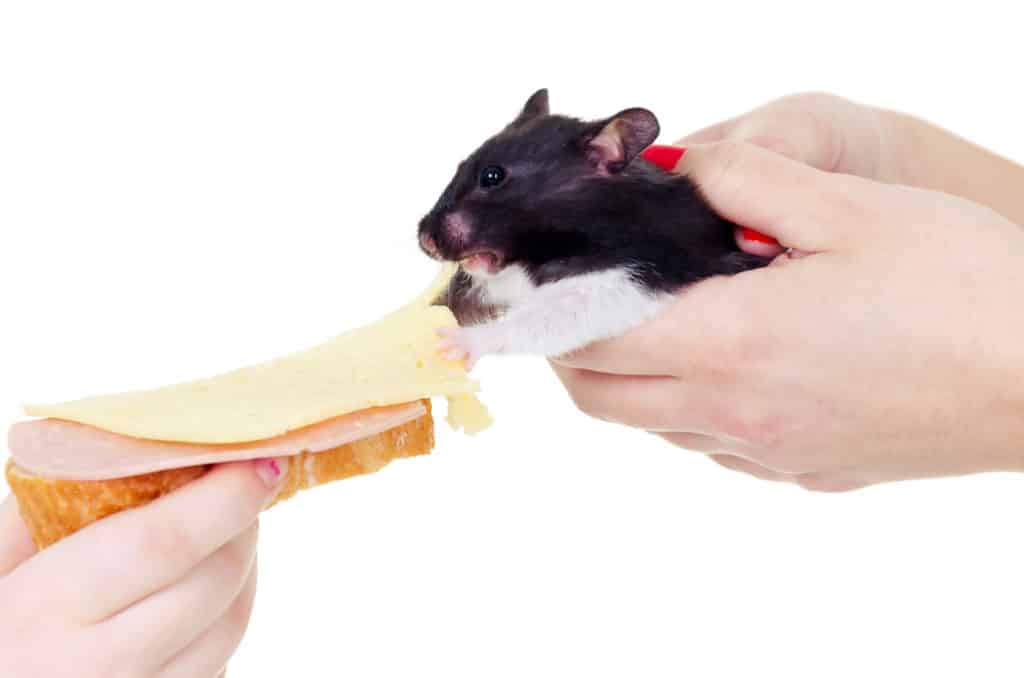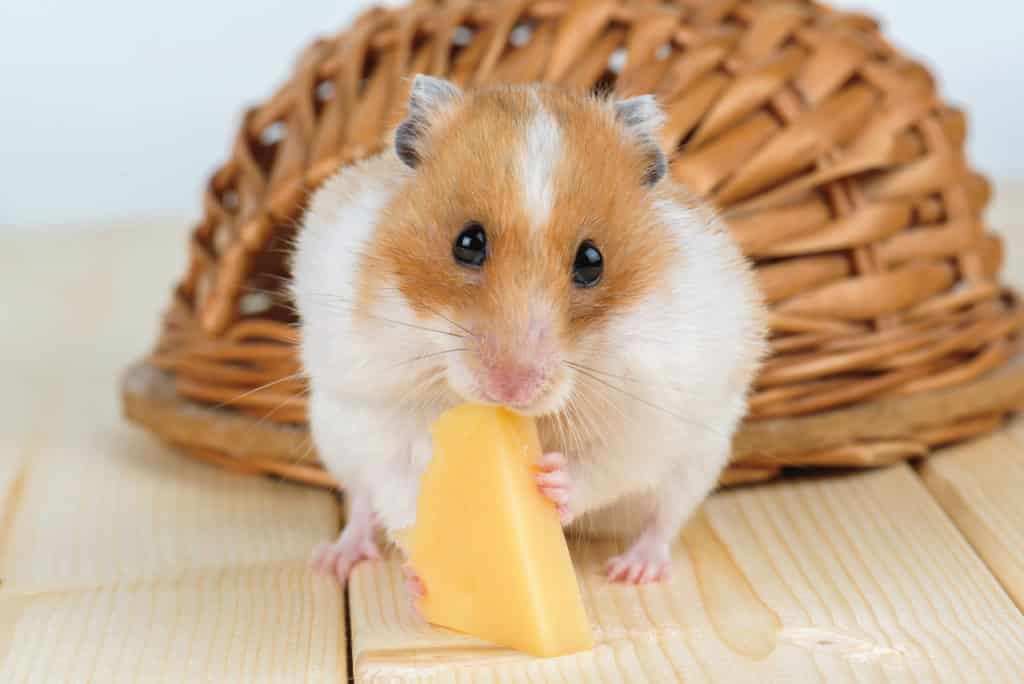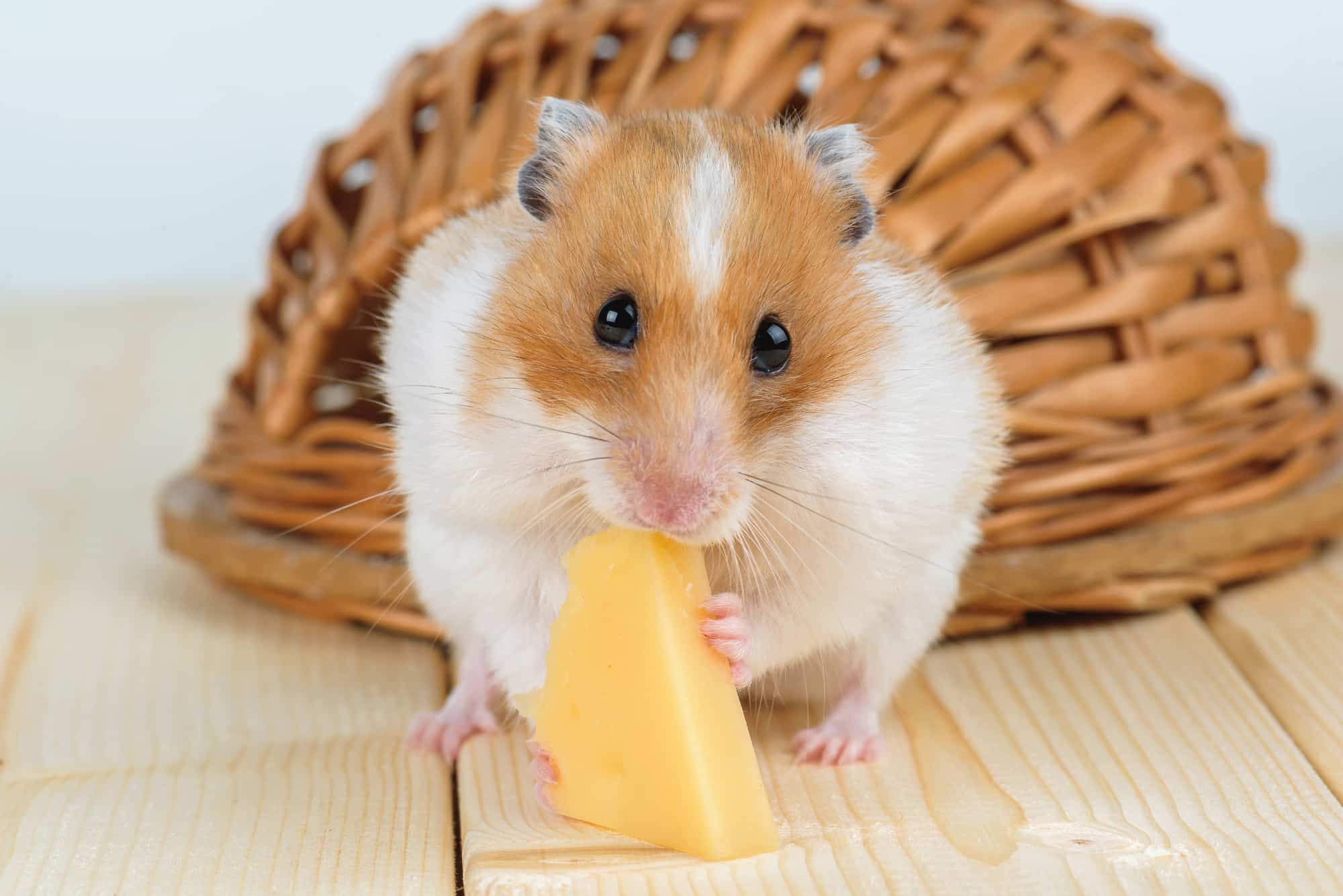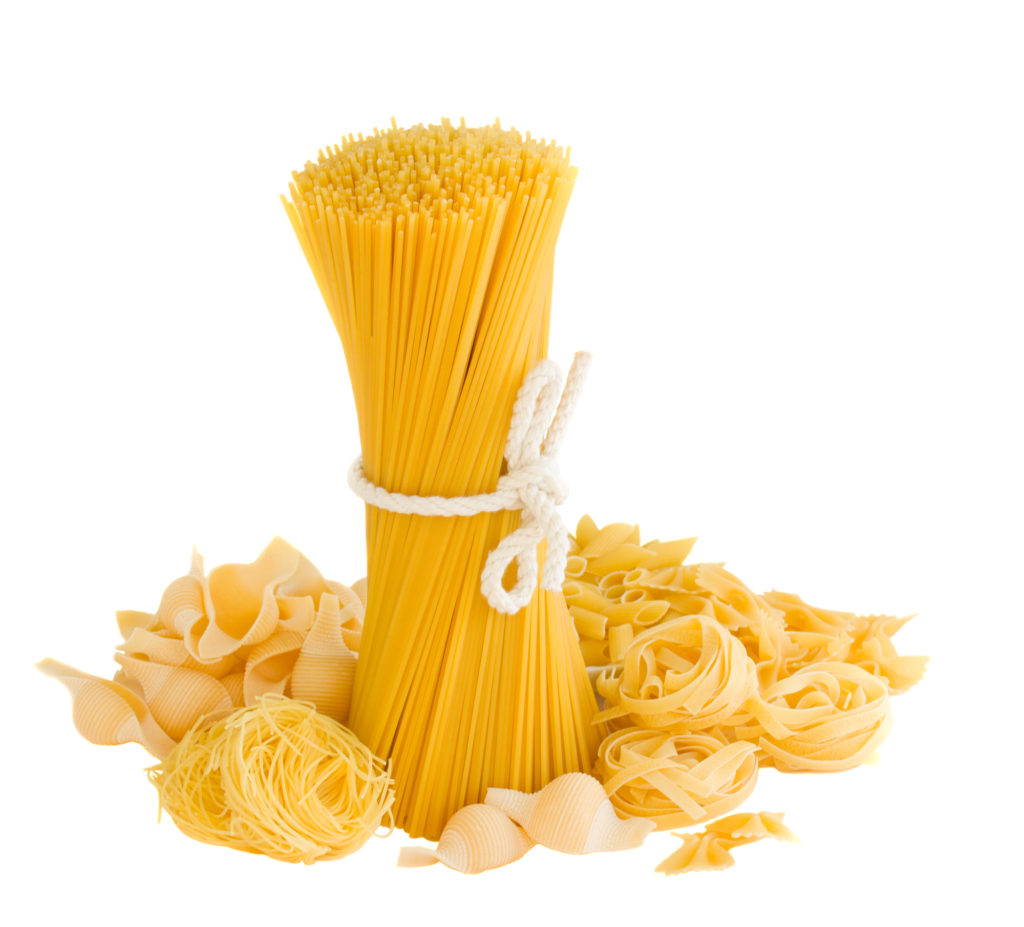Cheese is a very special food item. Depending upon the type of cheese you eat, cheese can have a peculiar taste when eaten raw that is not found in many other food items. Yet, when heated to the right amount, it becomes creamy and crispy and tastes different. So, many people around the world love its taste. If you are a hamster owner who loves eating cheese, you may be tempted to give it to your hamster as well. But do you know if hamsters can eat cheese? Is cheese good for hamsters? If so, how much and how often can they eat it? How can it affect their health? Read on to find out.
Cheese
Before we dive in and find out if hamsters can eat cheese, let’s first look at what cheese is and where it came from.
Cheese is a dairy product. It is produced from the milk of cow, buffalo, sheep, goat, reindeer, camel, or sometimes, even yak. It comes in various textures and flavors.
Origin
Nobody knows when humans exactly started making cheese. But it could have well been over 7,000 years ago (Source: Wikipedia). Our ancestors probably developed cheese accidentally while transporting milk in bladders made from the guts of herbivorous animals. The bacteria that naturally occurs in milk could have fermented it. The rennet that occurs naturally in the guts of herbivorous animals could have then converted the fermented milk into curd. The curd, which was left alone for extended periods of time, could have later become cheese.
This is probably how our ancestors stumbled upon cheese. Today, several millennia after the cheese was first developed accidentally, cheesemaking has become much more refined and sophisticated. Indeed, it has developed so much that it could even be considered an art. Just by varying the process a little (changing the ingredients, temperature, duration, etc.), we have managed to produce more than a thousand varieties of cheese. Yet, the basic process of producing cheese has remained the same all this time. Indeed, it is so simple that anyone could do it.
How is cheese produced?
First, milk is heated to bring it to a warm temperature.
Then, starter bacteria is added to it. These bacteria then ferment the lactose in milk into lactic acid without the use of oxygen. Sometimes, acids like lemon juice, vinegar can also be added instead of bacteria. It is also possible to make cheese without adding bacteria because milk contains some bacteria naturally. The warm temperature aids the growth of these bacteria.
Once the milk ferments, an enzyme called rennet is added. Rennet converts the milk into a solid mass (curd), and during this time, milk is kept still.
As in most food items, the presence of moisture and bacteria can make the curd go bad quickly. So, the curd is now cut slowly to release the water (whey) from it. It is then slowly stirred and cooked to remove more whey from it. The cheese that remains is then pressed to extract the remaining whey. Then, salt is added to slow down the bacteria, and the cheese is left to dry.
Finally, the cheese is left to age under the right temperature and humidity to produce more flavor and the right texture (Source: Cheesemaking101).
Can hamsters have cheese? Is cheese safe for hamsters?
The amount of nutrients in different types of cheese vary significantly. So, depending on the type of cheese, the health benefits may differ. But having said that, cheese does not contain any toxic chemicals that can be poisonous. So, if the cheese hasn’t gone bad, it can be a healthy treat for your hamster.
Health benefits of cheese
1. Calcium is an important mineral for your hamster’s body. It is needed for various functions like muscle function, hormone secretion, message transmission in nerves, etc. But only a very small portion of the consumed calcium is used for this purpose. Most of the calcium is stored in bones. Calcium is also lost every day as dead cells, hair, nails, etc. So, since calcium cannot be created by the body, it must come from outside through dietary intake. If not, the body starts taking calcium from the bones. This makes your hamster’s bones eventually weaker. So, they can fracture easily. To prevent this, you should give your hamster food items rich in calcium. Cheese is one of the best sources of calcium. So, cheese, particularly the ones fortified with vitamin D, can make your hamster’s bones stronger and protect them from fractures.
2. The calcium present in cheese can also keep your hamster’s teeth stronger and protect them from erosion. It is a vital mineral for rodents like hamsters, whose teeth keep growing constantly.
3. Cheese is a very good source of protein. Protein is one of the basic building blocks of the bodies of all animals. It is present in organs, muscles, bones, nails, and hair. So, it is needed for the formation and repair of tissues. Protein also keeps the immune system strong and keeps hair healthy. But since the body can’t store protein, it should be consumed through diet every day. Failure to do so could cause problems like shrinkage of muscular tissues. But since cheese contains a sufficient amount of proteins, it can protect your hamster from such problems. But don’t forget to choose the right type of cheese for your hamster. High-protein cheese like Parmesan can be a healthy snack for your hamster if given occasionally.
4. Vitamin B12 is needed for the production of protein, red blood cells, and DNA and to maintain good mental health. Lack of this vitamin could cause muscle weakness and neurological damage. It is mainly found in animal products. Cheese is a good source of vitamin B12 (Source: Lively run).
5. Cheese contains a lot of saturated fats. Even though fat was believed to be unhealthy in the past, it is not the case today. Some types of fats – both unsaturated and saturated – are found to be healthy. Fats help keep your hamster full for a longer time so that he doesn’t overeat sugars. Fat is also needed for the absorption of fat-soluble vitamins.
6. Since cheese is a fermented food, it contains good bacteria that can benefit your hamster’s guts.
Risks
1. The fats in cheese may be considered healthy. Yet, no more than 6% of a hamster’s diet can comprise of fats. Since hamsters are tiny creatures, they can become obese quickly if they eat too much fat. And since hamsters like to run around and play most of the time, obesity can change their lifestyle significantly and reduce their lifetime considerably. So, you can only give little amounts of cheese to your hamster.
2. Too much of saturated fat can cause obesity, diabetes, and cardiovascular problems (Source: Medical news today). So, giving cheese too often to your hamster could be dangerous.
3. Most cheese varieties contain a lot of sodium. Too much sodium can be bad for your hamster’s body since it can increase blood pressure and cause heart diseases.
4. Cheese contains a lot of sodium and salt. Both sodium and salt can cause dehydration (Source: Eat This, Not That!). So, if your hamster doesn’t drink enough water, feeding too much cheese to him can be dangerous.
5. Cheese is not a food item that a hamster eats in his natural habitat. So, the bodies of some hamsters may not be capable of digesting cheese properly. This is mainly due to lactose, a type of sugar found in cheese and other dairy products. To break down lactose, a special enzyme called lactase is needed (Source: WebMD). But the bodies of all hamsters do not produce the same amount of lactase. Therefore, some hamsters may not be able to break down lactose if their bodies do not produce sufficient amounts of lactase. These hamsters are lactose intolerant. If your hamster is lactose intolerant (diarrhea and vomiting are the most common symptoms), you should avoid giving cheese and other dairy products completely.
Different breeds of hamsters vs. cheese
Different breeds of hamsters differ in size significantly. So, there is no ‘one size fits all’ approach when it comes to feeding cheese to hamsters.
Can Chinese dwarf hamsters eat cheese?
Yes, they can. But Chinese dwarf hamsters are smaller in size compared to some other hamster breeds. So, you should not give too much cheese to them. A small piece of cheese every fortnight should be more than enough.
Can Campbell dwarf hamsters eat cheese?
Yes, they can. But just like Chinese hamsters, Campbell hamsters can also eat only a tiny piece of cheese once every two weeks.
Can Russian dwarf hamsters eat cheese?
Yes, but not more than a small piece every two weeks.
Can Roborovski hamsters eat cheese?
Yes, they can. Robo hamsters are smaller than other dwarf hamsters. But they are also more active than other dwarf hasmters. So, they can eat more cheese than other dwarf hamsters. They can eat two small pieces of cheese every two weeks.
Can Syrian hamsters eat cheese?
Syrian hamsters are the largest breed of hamsters. So, they can eat about three small pieces of cheese every fortnight (Source: Just hamsters).
Frequently Asked Questions
What kind of cheese can hamsters eat?
First, you should understand that cheese is not indispensable for your hamster’s health. The nutritional benefits that cheese offers can also be obtained from other food items. The commercially available hamster pellets and mixed foods contain most of the nutrients that your hamster needs every day. Moreover, the vitamins and minerals that cheese contains can also be obtained from fruits and vegetables. Fats and proteins can also be obtained from nuts like almonds (Our blog post Can hamsters eat almonds? can help you in this regard).
So, your hamster doesn’t need cheese to stay healthy. However, if you really want to share the taste of cheese with your hamster without affecting his health, you can opt for the low-fat, low-sodium varieties. We have compared the nutritional content in 100g of some of the most common varieties of cheese below. Please note that these values are for reference only. The exact amount of nutrients in the cheese that you purchase from the store might vary.
| Cheddar | Cottage cheese | Mozzarella | Gouda | Swiss cheese | Parmesan (Hard) | Ricotta | Blue cheese | |
| Calories | 403 | 103 | 302 | 356 | 380 | 392 | 156 | 353 |
| Total fats (g) | 33.14 | 4.51 | 20.03 | 27.44 | 27.8 | 25.83 | 10.44 | 28.74 |
| Saturated fat (g) | 21.092 | 2.853 | 12.67 | 17.61 | 17.78 | 16.41 | 6.611 | 18.67 |
| Polyunsaturated fat (g) | 0.942 | 0.139 | 0.626 | 0.657 | 0.972 | 0.569 | 0.323 | 0.8 |
| Monounsaturated fat (g) | 9.391 | 1.285 | 5.73 | 7.747 | 7.274 | 7.51 | 2.971 | 7.78 |
| Cholesterol (mg) | 105 | 15 | 54 | 114 | 92 | 68 | 41 | 75 |
| Sodium (mg) | 621 | 405 | 528 | 819 | 192 | 1,602 | 104 | 1,395 |
| Carbohydrates (g) | 1.28 | 2.68 | 3.83 | 2.22 | 5.38 | 3.22 | 4.09 | 2.34 |
| Fiber (g) | 0 | 0 | 0 | 0 | 0 | 0 | 0 | 0 |
| Sugar (g) | 0.52 | 0.29 | 0.6 | 2.22 | 1.32 | 0.8 | 0.29 | 0.5 |
| Protein (g) | 24.9 | 12.49 | 25.96 | 24.94 | 26.93 | 35.75 | 11.32 | 21.4 |
| Calcium (mg) | 721 | 60 | 731 | 700 | 791 | 1,184 | 24 | 528 |
| Iron (mg) | 0.68 | 0.14 | 0.25 | 0.24 | 0.2 | 0.82 | 0.41 | 0.31 |
| Potassium (mg) | 98 | 84 | 95 | 121 | 77 | 92 | 115 | 256 |
| Vitamin A (mcg) | 265 | 44 | 137 | 165 | 220 | 108 | 114 | 198 |
As you can see, cottage cheese is the best option for you if you need a low-fat, low-calorie, low-sodium option. What’s more, it even contains a decent amount of protein, calcium, iron, potassium, and vitamin A as well. The next best option is Ricotta.
You can even opt for the low-fat versions of some of the above cheese varieties, like low-fat cottage cheese, reduced-fat cheddar, or low-fat Swiss cheese. But the reduced-fat versions may not contain the same amount of some useful minerals as their original versions.
| Cheddar (Reduced fat) | Low-fat Cottage cheese | Swiss cheese (low fat) | |
| Calories | 282 | 88.4 | 179 |
| Total fats (g) | 18.3 | 2.65 | 5.1 |
| Saturated fat (g) | 11.6 | 1.76 | 3.304 |
| Polyunsaturated fat (g) | 0.75 | 0 | 0.18 |
| Monounsaturated fat (g) | 5.02 | 0 | 1.351 |
| Cholesterol (mg) | 56 | 13 | 35 |
| Sodium (mg) | 725 | 398 | 260 |
| Carbohydrates (g) | 2 | 4.424 | 3.4 |
| Fiber (g) | 0 | 0 | 0 |
| Sugar (g) | 0.58 | 3.53 | 1.33 |
| Protein (g) | 27.2 | 11.5 | 28.4 |
| Calcium (mg) | 905 | 92 | 961 |
| Iron (mg) | 0.13 | 0.17 | |
| Potassium (mg) | 93 | 140 | 111 |
| Vitamin A (mcg) | 150 | 55 | 40 |
What happens if my hamster eats too much cheese?
When you feed cheese to your hamster, the odds are that he would love the taste and want more.

But you should remember that, unlike fruits and vegetables, cheese is a high-fat, high-calorie food item. So, for small creatures like hamsters, cheese can bring doom if not fed in moderation. The high amount of calories can quickly lead to obesity and diabetes, and the high amount of saturated fats can cause cardiovascular problems. Depending on the amount of salt content in the cheese you offer, your hamster could get dehydrated as well.
Moreover, your hamster could store the extra cheese in his cheek pouches to stove it for later use. If that happens, it won’t take a long time for the cheese to go bad. And rotten food products are deadly for hamsters because their small digestive systems cannot handle them. So, it is important that you don’t give too much cheese to your hamster.
What happens if my hamster eats cheese every day?
As explained in the section above, it could cause obesity, diabetes, and cardiovascular problems.
What should I do if my hamster ate too much cheese?
First of all, make sure that you don’t give your hamster too much cheese (or any other food item).
If you give too much cheese, your hamster might store the extra cheese in his cheek pouches and then bury it later somewhere in his cage. So, check your hamster’s bedding and cage every night. Should you find any secretly stored cheese or other food items, remove them immediately.
If you feed too much cheese accidentally, look for changes in your hamster’s behavior. If a loss of appetite, vomiting, or diarrhea occurs, or if your hamster becomes lethargic, consult a veterinary doctor immediately.
Can hamsters eat cheese pizzas? Can hamsters eat cheese puffs?
Fast foods like cheese pizza, cheese puffs, etc., and other processed cheese products are a big no-no for your hamster. Fast foods could contain more calories, more sugars, and more sodium than cheese. And since we already know how deadly this combination can be for hamsters, you should hold yourself back from giving any sort of fast food to your hamster.
When should I not give cheese to my hamster?
Cheese has lactose. So, if your hamster is lactose intolerant, you should avoid cheese and other dairy products altogether.
Cheese contains a lot of calories. So, if your hamster is already obese, cheese should be avoided.
Cheese contains salt, which can cause dehydration in hamsters pretty quickly. So, if your hamster doesn’t drink much water, cheese might prove dangerous to him.
Summary – Takeaways
There are more than a thousand varieties of cheese. But most of these varieties are not toxic for humans or pets. So, hamsters can eat cheese. Cheese offers several health benefits:
- Cheese is a good source of calcium, which is required for the strengthening of teeth and bones of your hamster.
- Some cheese varieties also contain small amounts of Vitamin D, which helps the body absorb calcium.
- Cheese is a great source of protein as well. Protein is one of the basic building blocks of the body, which is found in organs, muscles, bones, nails, and hair.
- Cheese contains a lot of good bacteria that can benefit the guts of your hamster and boost his gastrointestinal health.
- It contains healthy fats that help the body absorb vitamins.
But even though cheese offers a lot of health benefits, it is also rich in calories. Moreover, saturated fats are not good when consumed in high quantities. The salt content in cheese is also an object of concern. So, cheese should only be used as an occasional treat for your pet hamster.
How to give cheese to your hamster?
- Pick a low-fat soft cheese like cottage cheese.
- Give a small bit of cheese when you are starting out.
- Observe your hamster for at least the next 24 hours. If he shows any loss of appetite or suffers from diarrhea, stop cheese immediately and contact a veterinary doctor.



